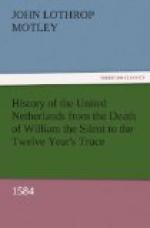The object of the war between the Netherlands and Spain was not, therefore, primarily, a rebellion against established authority for the maintenance of civil rights. To preserve these rights was secondary. The first cause was religion. The Provinces had been fighting for years against the Inquisition. Had they not taken arms, the Inquisition would have been established in the Netherlands, and very probably in England, and England might have become in its turn a Province of the Spanish Empire.
The death of William the Silent produced a sudden change in the political arrangements of the liberated Netherlands. During the year 1583, the United Provinces had elected Francis, Duke of Anjou, to be Duke of Brabant and sovereign of the whole country, under certain constitutional provisions enumerated in articles of solemn compact. That compact had been grossly violated. The Duke had made a treacherous attempt to possess himself of absolute power and to seize several important cities. He had been signally defeated in Antwerp, and obliged to leave the country, covered with ignominy. The States had then consulted William of Orange as to the course to be taken in the emergency. The Prince had told them that their choice was triple. They might reconcile themselves with Spain, and abandon the contest for religious liberty which they had so long been waging; they might reconcile themselves with Anjou, notwithstanding that he had so utterly forfeited all claims to their consideration; or they might fight the matter out with Spain single-handed. The last course was, in his opinion, the most eligible one, and he was ready to sacrifice his life to its furtherance. It was, however, indispensable, should that policy be adopted, that much larger supplies should be voted than had hitherto been raised, and, in general, that a much more extensive and elevated spirit of patriotism should manifest itself than had hitherto been displayed.
It was, on the whole, decided to make a second arrangement with the Duke of Anjou, Queen Elizabeth warmly urging that course. At the same time, however, that articles of agreement were drawn up for the installation of Anjou as sovereign of the United Provinces, the Prince had himself consented to accept the title of Count of Holland, under an ample constitutional charter, dictated by his own lips. Neither Anjou nor Orange lived to be inaugurated into the offices thus bestowed upon them. The Duke died at Chateau-Thierry on the 10th June, and the Prince was assassinated a month later at Delft.
What now was the political position of the United Provinces at this juncture? The sovereignty which had been held by the Estates, ready to be conferred respectively upon Anjou and Orange, remained in the hands of the Estates. There was no opposition to this theory. No more enlarged view of the social compact had yet been taken. The people, as such, claimed no sovereignty. Had any champion




